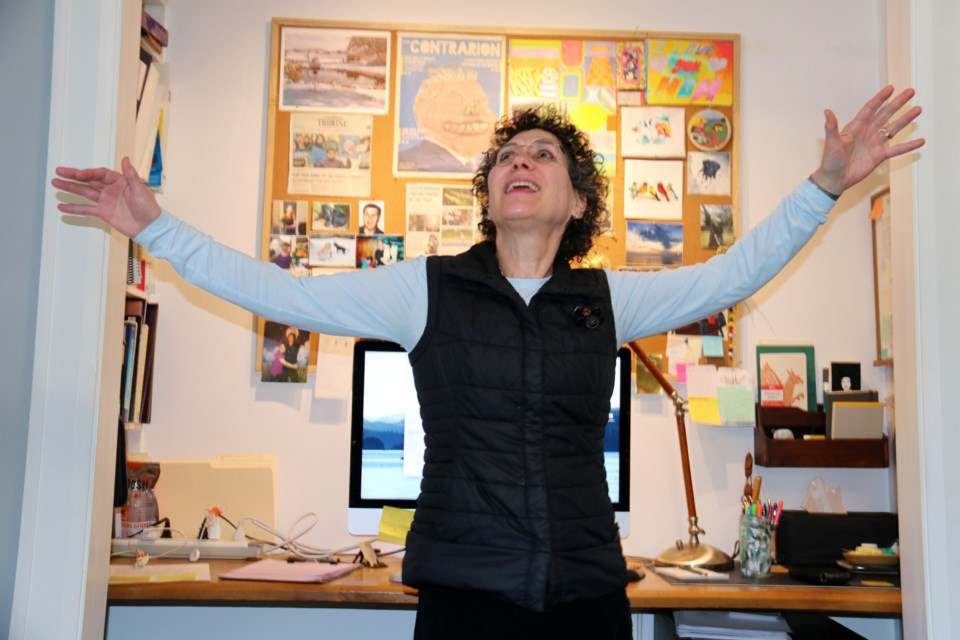What started as a tweet in defiance of Parkinson’s disease has turned into a global online awareness campaign.
Barbara Salsberg Mathews tweeted a video of herself dancing in February, saying the disease can’t stop her from dancing. It prompted a flood of responses from others living with Parkinson’s, many posting videos of themselves dancing.
Now, alongside PD Avenger’s Richelle Flanagan, Salsberg Mathews is launching an awareness campaign titled ‘Dopamine Dance Against PD.’
From April 3 to 11, the pair are asking everyone to boost their dopamine and raise awareness about the fastest growing neurological condition by posting videos of themselves busting a move.
She said she’s been talking to Parkinson’s organizations in the UK, Europe, the U.S. and Canada, all of whom are working with their marketing teams to promote the campaign.
“It’s grown into something huge that I never imagined,” Salsberg Mathews said. “It became an international dance party.”
The disease affects 10 million people, she said, 40 per cent of whom are women, and 30 per cent are under the age of 60.
While there is no cure, more and more research suggests dancing can have a powerful impact when it comes to things like dopamine, gait and balance.
“It’s a really good boost of energy. Even if you feel sluggish, if you just get up and shake a little bit, it helps release endorphins,” she said. “And it’s fun. We’ve got to have fun and laugh.”
These benefits are often seen first-hand during Sarah Jane Burton’s Park’n Dance class in Guelph.
A lifelong dancer, Burton founded the class in 2016, after learning about a class in Cambridge where the instructor taught dance to people with Parkinson’s.
“I thought, what a wonderful way to give back to the community, doing something that I love to do,” she said.
The concept is inspired by Dance for PD, which started in New York more than 20 years ago and now offers classes in more than 300 communities in 28 countries.
“I’ve danced all my life. I know that it’s magical, but this was beyond my expectations.”
She choreographs the dance moves, using “a lot of imagination” and storytelling.
They might start with something that warms up their hands.
One way she walks the class through the movements is with four letter words, like rain.
For instance, she said you would write an ‘R’ with your arm, changing arms for each letter.
Then, going through the alphabet, she uses imagery to encourage the movement, asking participants to imagine gathering up sunshine between their palms as they press them together, moving upwards before bursting open to make a ‘Y.’ Then, going into the Z, they imagine the petals fluttering down off a tree.
Since people with Parkinson’s often struggle with movement, sometimes experiencing freezing where they can’t move at all, the imagery helps them worry less about how the movement is coming out, focusing only on the images instead, she said.
While the benefits are not guaranteed, she said they can be both “immediate and joyful.”
“Sometimes people may have a bit of a shuffle walk coming in, but when (music) is playing, they’re just lively. They move more freely with their legs and feet,” she said. “I can’t tell you why it works, but it does.”
Participants can stand or sit, and can move as much or little as they’re comfortable with.
There are usually between five to 15 or 20 people in the class at any given time; it varies depending on the week.
Volunteers are always on hand to keep things running smoothly, by offering stability or getting meds when needed, for example.
Each class runs for about 45 minutes to an hour, and typically has some time carved out for socializing at the end.
In person, the sessions take place at Harcourt Memorial United Church. However, since the pandemic, they have been primarily over Zoom every Thursday at 1 p.m.
Burton said they plan to begin transitioning to a hybrid version soon, with some classes online and some in-person. The zoom classes are free, but the in-person classes typically go by donation so they can supply refreshments at the end of the class.
They hope to expand the class to offer one specifically for younger people with early onset Parkinson’s. In the meantime, she said everyone is welcome, regardless of what stage they are in.
For those participating in the awareness campaign, the hashtags #dopaminedancepd, #dancepartypd and #dance4parkinsons are encouraged.
